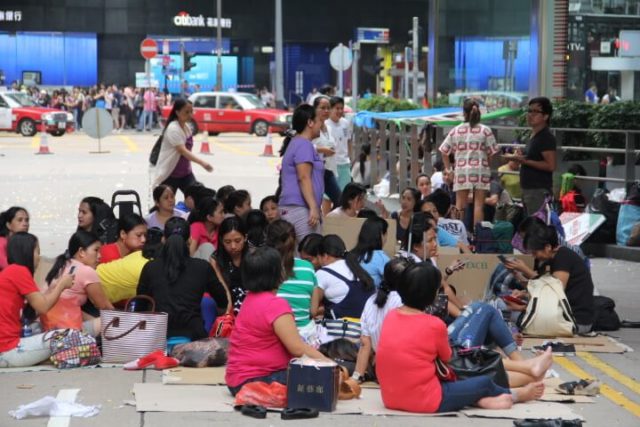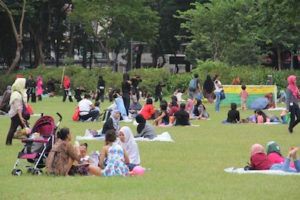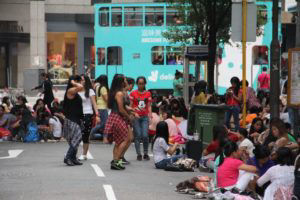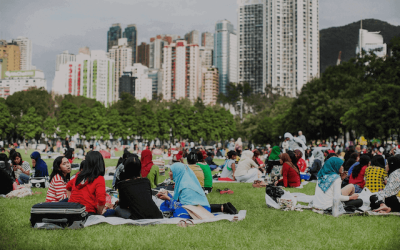
Foreign domestic helpers comprise about 10 percent of the working population in Hong Kong. That is over 390,000 people, making up a whopping 4.6 percent of the total population. With a vast majority of female employees making up this statistic, so much of city commerce and living depends on these valuable foreign workers community. Constantly demanding work schedules and fast-paced lifestyles overwhelming Hong Kong residents have resulted in minuscule amounts of time left for the care of the household and its immediate needs. As a result, local families have relied on the assistance of migrant workers for over four decades.
Helper Community in Hong kong
This relationship dates back to the economic rise of Hong Kong during the 1970's and 1980's, when more and more women entered the ever growing and dynamic workforce predominated by service industries. This increasingly resulted in families needing extra help around the home. Filipino workers have been the largest and most eager group to offer this help. So much so, that the Philippine consulate accredits local agencies dealing with workers from the Philippines. Indonesian helpers are the second largest group entrusted with this labor, with numbers increasing steadily over the last decade and at times rivaling those of the Filipino workers. Other South East Asian countries have not failed to provide a strong supply of workers, including those from Thailand having a significant presence. Vietnam might be the only exception to this rule, as Vietnamese are not permitted to work in the domestic sphere due to historical problems with refugees from the country. Foreign domestic workers live in their employer's home and are to be supplied with satisfactory living quarters with privacy, as required by the Immigration Department of Hong Kong. The helper community is mainly comprised by dedicated and hard-working women who tend to each home’s needs, from care for children and the elderly to household chores. Cooking, cleaning, shopping and other vital home enterprises are relegated to them in full confidence. The wages received, in return for the labor, are relatively high for the standards back home and thus usually sent as remittances because entire families rely on this single income. This compensation is an addition to the received visa, medical expenses, and airline tickets which are ensured by a legal contract for each worker. Usually, the agreement spans a period of two years, thus providing and safeguarding the worker with all of her rights.
The most fascinating aspect of this group of workers is the strong community they have built around their trade.

This can be seen every Sunday, their rest day from work, in a very public display of unity through socialization, self-expression, and relaxation. Thousands of domestic workers can be seen converging in the public spaces around the heart of downtown Hong Kong. At the scenic Victoria Park, located in beautiful Causeway Bay, predominately Indonesian workers can be spotted playing together, chatting, gossiping, eating, and even singing. Similarly, Filipino workers tend to meet in the heart of central Hong Kong at Statue Square doing parallel activities. Additionally, through the efforts of cultural groups and other types of organizations, the migrants can be seen rallying for their rights. They are clearly able to understand and defend their rights, preserve their national and cultural idiosyncrasies, as well as grow their own society as a whole through jovial activities. Singing and dancing performances are commonly put on by groups formed by the foreign workers with the intent to please their companions and the local people.

The government has even gone as far as blocking off these areas to cars and makes them pedestrian-only on Sundays. This, of course, has not been done exclusively for the gatherings, but for all the residents to enjoy. Other efforts include increased security and sanitation services available to maintain these spaces, in addition to the placement of multilingual signs that cater to the patrons. Yet, this action starkly contrasts those of other migrant-heavy cities, such as Singapore and Dubai, where migrants’ rights to assemble freely in public areas have been restrained, if not even taken away, over the years.
Government and Community
The Hong Kong government has realized the importance of these gatherings for the mainly Filipino and Indonesian women, who have chosen these locations with reason. It just so happens, that their work places are close to key services and goods that they fundamentally need. They include the post office, Filipino and Indonesian produce markets, remittance agencies, and other similar integral places for their personal lives. By allowing them to meet freely and in plain sight, the government has been able to communicate its positive stance on diversity. This group is playing an essential role for families in Hong Kong but also for families in Philippines or Indonesia. Hong Kong and its inclusive attitude towards foreign domestic workers has been seen as an example for other migrant-heavy cities. The ability to congregate freely in centrally located public spaces without any interruption or disruption has been the norm. Locals have grown accustomed to the sight of thousands of domestic workers enjoying the open spaces and places around the city. In return, the foreign domestic helpers have grown to a single community with a clear identity and confidence. Diverse South East Asian cultures and personal stories, whether Filipino or Indonesian, merge on Sundays, in peace and harmony in one place. For this and their significant help in the lives of the grateful residents, Hong Kong is a much richer and better place. That is a fact, one that even the most disoriented tourist walking aimlessly on a Sunday, in the heart of the city, can see. The phenomenon is real, powerful, and one-of-a-kind. Helper community is strong!



